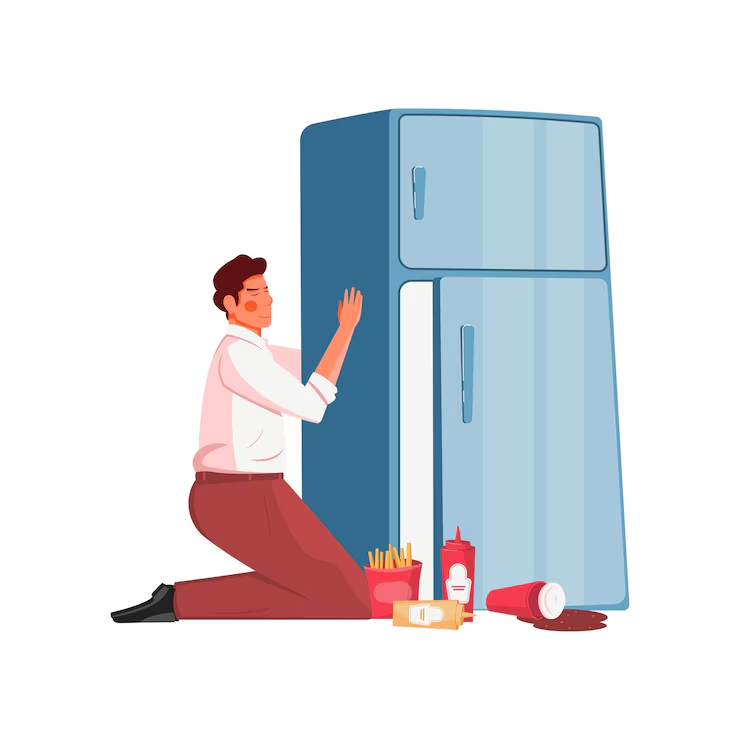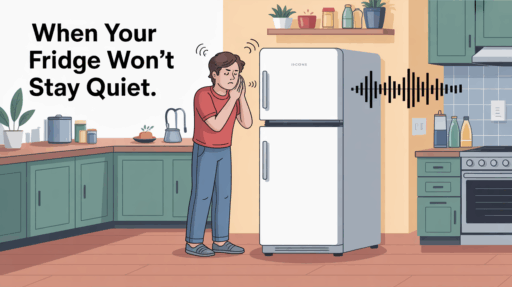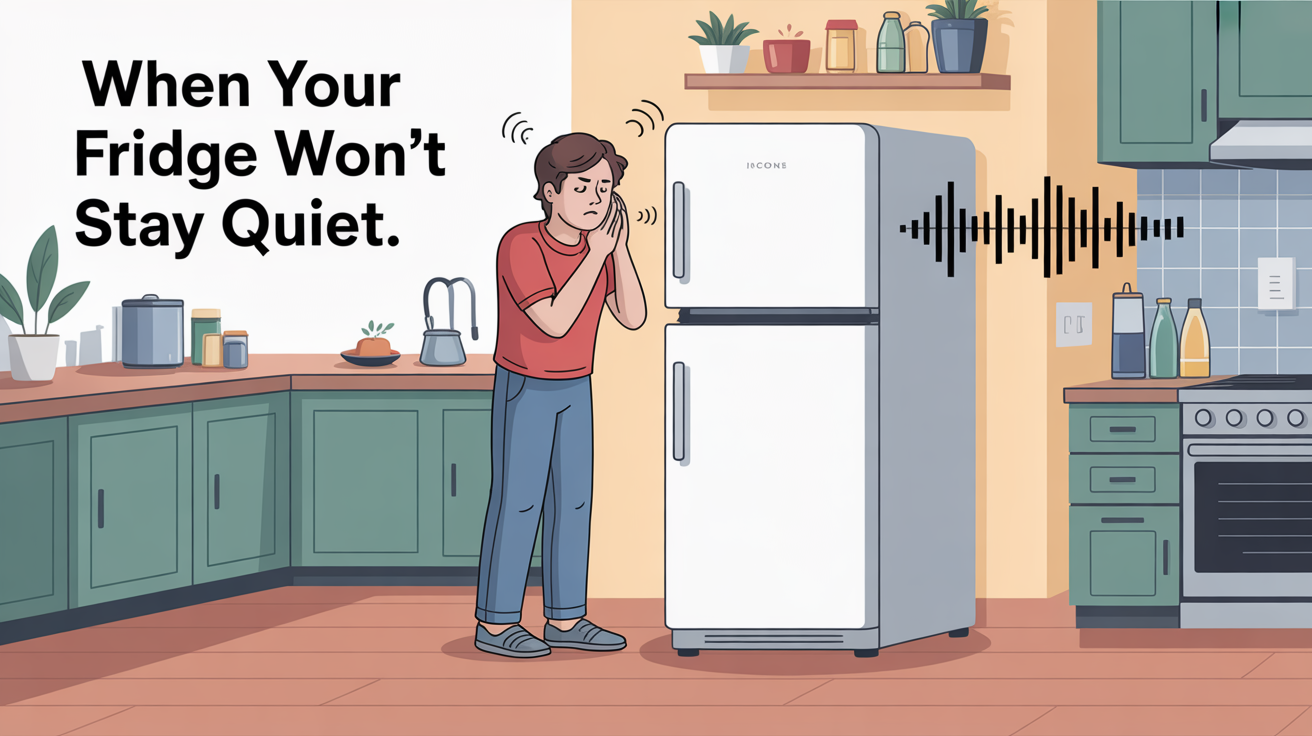Your refrigerator’s been humming along quietly for years. Then one day—clank! Or maybe it’s a buzz, a rattle, or something in between. Loud, disruptive, and downright puzzling. If this sounds familiar, you’re not alone. Many homeowners face the same issue. Luckily, help is just around the corner. In fact, trusted service providers like Noble BHS offer expert diagnosis and repairs for noisy refrigerators across Atlanta.
But before diving into your phone to schedule a service call, it’s worth understanding what might be causing the racket. Let’s break it down and explore practical solutions that don’t require a toolbox the size of Texas.

Common Culprits Behind Refrigerator Noise
First things first—refrigerators do make sound. A gentle hum, a soft click, the occasional whoosh of airflow. All normal. But when that hum turns into a persistent rattle or an odd buzzing, it’s time to investigate.
Evaporator fan issues rank high on the list. This fan circulates air throughout the freezer and fridge compartments. If it’s hitting ice buildup or loose wires, it can start to grind or buzz.
Condenser fan problems come next. Located at the back or underneath the fridge, this fan helps cool the compressor. If debris clogs it, or the blade bends, it can create a loud clattering noise.
Then there’s the compressor itself. This is the fridge’s engine, pumping refrigerant through the system. As it ages, it might start to hum louder or even knock.
Also, check the drip tray. Yes, something as small as a vibrating drain pan can amplify noise, especially if it’s loose or resting unevenly.
Ice makers can be noisy, too. When filling or dropping ice, they may click or pop. That’s usually normal, but if the sound changes or becomes erratic, it could be a jammed gear or water supply issue.
When Noise Becomes a Red Flag
Some sounds are harmless. Others? Not so much. Recognizing the difference is key to saving your fridge—and your wallet.
A low, steady hum typically signals normal compressor activity. But if that hum grows into a loud buzz, it might mean the compressor is struggling to cycle. That’s a red flag.
A rattling or vibrating sound might indicate something loose, perhaps the condenser coil touching the back panel. It’s easy to fix, but dangerous if ignored. Vibrations can damage components over time.
Clicking or popping often points to electrical components engaging, like defrost timers. One click? Fine. Repeated, rapid clicks? That’s a problem.
And then there’s the high-pitched squeal, usually from a worn-out fan motor. Left alone, it can seize up entirely, causing airflow issues or total cooling failure.
In short, if the noise is new, louder, or persistent, it’s probably worth checking out. Better safe than sorry.
Easy Fixes You Can Try Yourself
Not every noisy fridge needs a technician. Sometimes, the fix is easier than you think.
Check for loose items inside. Containers, jars, and pans can vibrate against one another during cycles. Rearranging shelves might eliminate the sound.
Vacuum the condenser coils. Dust and grime build up fast, especially if your fridge is near a kitchen entrance. Unplug it first, of course. Use a coil brush or vacuum hose to clear the gunk.
Secure the drip tray. It’s a plastic pan beneath the fridge, collecting condensation. If it shifts out of place, it can rattle or hum. Realign it and make sure it sits flat.
Inspect the fan blades. If you’re comfortable doing so, unplug the fridge, remove the back panel, and look at the fan blades. Debris? Ice? Bent plastic? Clean it up gently. No sharp tools.
Level the refrigerator. Yes, something as simple as uneven footing can cause excessive vibration. Adjust the front legs until the unit is balanced and stable.
These quick DIY moves might not fix every noise, but they’re smart first steps that rule out basic causes.
When to Call a Professional
Sometimes, the noise just won’t go away. That’s when you need expert help.
If your fridge hums louder than before and struggles to stay cool, the compressor could be failing. That’s a job for a pro.
If your fan motor squeals, grinds, or refuses to turn, it might need replacement. These parts wear out over time, and improper installation can lead to more damage.
Electrical issues, like repeated clicking or tripped breakers, should be left to licensed repair techs. Safety first.
Also, strange smells or heat around the back of the unit? Call someone immediately. These can be signs of overheating or refrigerant leaks.
Professional repair techs, like those at Noble BHS, have the tools and training to pinpoint the issue fast. More importantly, they’ll fix it safely and correctly—saving you time and headaches.
Tips to Prevent Future Noise
Nobody wants to deal with a noisy fridge twice. The good news? Preventive care makes a big difference.
Clean the coils regularly. Once every six months should do it. More often, if you have pets.
Leave space behind the fridge. At least 2 inches. This improves airflow and reduces overheating, which can strain the compressor.
Check and replace water filters. Old filters affect ice makers and can cause unusual sounds during refill cycles.
Defrost your freezer. Don’t let ice build up around the fan blades. It creates airflow problems and noise.
Avoid overloading shelves. Too much weight or poorly balanced containers can cause doors to misalign and shelves to rattle.
Also, listen. Every now and then, just stand near your fridge and tune in. Noticing changes early gives you a chance to act before things escalate.
Noise by Model: What to Expect
Different fridges make different sounds. What’s normal for one may be unusual for another. Understanding your specific model helps you spot true concerns faster.
Side-by-side units tend to run fans more frequently. You might hear soft whirring or low-pitched droning. That’s expected.
Top-freezer models often make clicking sounds as the defrost system kicks in. No worries—unless it’s rapid or nonstop.
Bottom-freezer fridges sometimes gurgle as refrigerant moves through the coils. It can sound like water boiling or sloshing. Totally fine.
Smart fridges with advanced compressors or Wi-Fi modules might buzz more due to extra electronics. But loud grinding or repeated beeping? That’s a different story.
Older models tend to get noisier with age. Bearings wear down. Parts loosen. They’re workhorses, but they do get cranky. Don’t ignore the signs—schedule service before it breaks for good.
If you’re unsure whether a sound is normal, check your manual. Or call a technician who knows your model inside and out.
Silence Is Golden
A noisy fridge can keep you up at night. It can interrupt conversations, turn heads, and cause stress you didn’t sign up for. But with the right knowledge—and a few simple actions—you can turn down the volume and restore peace to your kitchen.
Start with easy checks. Listen closely. Vacuum the coils. Reorganize the interior. If the noise persists or worsens, don’t gamble. Call a trusted expert. Noble BHS is a reliable choice for Atlanta residents looking for honest, skilled, and fast appliance repairs.
Remember, appliances aren’t just conveniences. They’re investments. Keeping them running quietly and efficiently isn’t just about comfort—it’s about protecting what matters.
And if you’re in the market for a new unit or wondering what’s worth your hard-earned cash, check out this guide to the best refrigerator brand to make a choice that stays quiet, cool, and dependable for years to come.
Assets:








